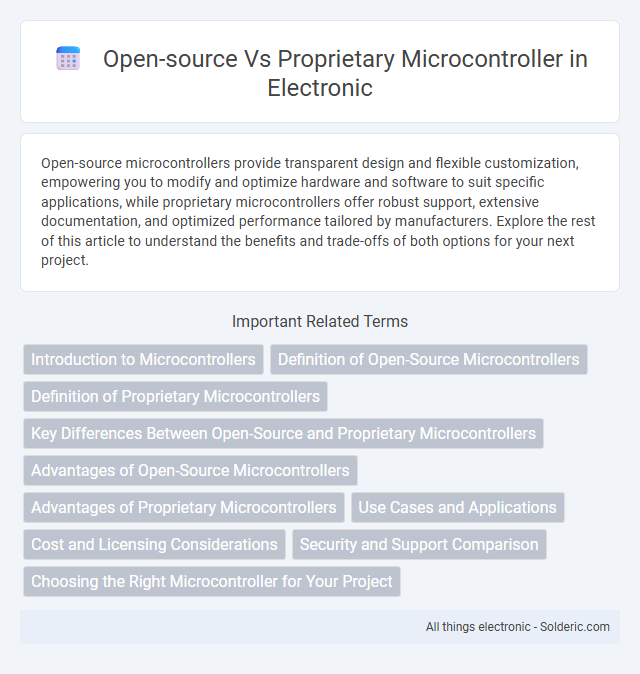Open-source microcontrollers provide transparent design and flexible customization, empowering you to modify and optimize hardware and software to suit specific applications, while proprietary microcontrollers offer robust support, extensive documentation, and optimized performance tailored by manufacturers. Explore the rest of this article to understand the benefits and trade-offs of both options for your next project.
Comparison Table
| Feature | Open-source Microcontroller | Proprietary Microcontroller |
|---|---|---|
| Source Code Access | Fully accessible; community-driven development | Closed; controlled by manufacturer |
| Cost | Generally low or free | Often higher licensing and development costs |
| Customization | High; users can modify hardware and firmware | Limited to manufacturer-provided options |
| Support | Community support; limited official resources | Professional support and official documentation |
| Security | Transparent security; vulnerabilities can be audited | Security features managed by the vendor |
| Development Tools | Open-source IDEs and toolchains | Proprietary IDEs and advanced toolchains |
| Integration | Flexible integration with various systems | Optimized for specific ecosystems |
| Examples | RISC-V, Arduino | STM32, PIC, AVR (proprietary models) |
Introduction to Microcontrollers
Microcontrollers are compact integrated circuits designed to execute specific tasks within embedded systems, featuring a processor core, memory, and programmable input/output peripherals. Open-source microcontrollers provide transparent hardware and software designs, enabling customization, collaboration, and cost-effective innovation. Proprietary microcontrollers, meanwhile, offer specialized performance, vendor support, and optimized software ecosystems tailored to commercial applications and stringent quality standards.
Definition of Open-Source Microcontrollers
Open-source microcontrollers are embedded systems with publicly accessible schematics, firmware, and design files, enabling users to modify, distribute, and customize the hardware and software freely. These microcontrollers promote transparency, collaboration, and innovation by allowing developers to inspect, improve, and adapt the technology for specific applications. Examples include the Arduino platform and Espressif's ESP32, which provide extensive community support and hardware flexibility compared to proprietary alternatives.
Definition of Proprietary Microcontrollers
Proprietary microcontrollers are integrated circuits designed and controlled exclusively by a specific company, with source code, hardware designs, and development tools kept confidential. These microcontrollers offer specialized features and optimized performance tied to the manufacturer's ecosystem but limit customization and third-party modifications. You should consider proprietary microcontrollers when seeking a stable, vendor-supported solution with dedicated resources and warranty.
Key Differences Between Open-Source and Proprietary Microcontrollers
Open-source microcontrollers offer customizable hardware designs, transparent documentation, and community-driven support, ideal for innovation and cost-effective projects. Proprietary microcontrollers provide optimized performance, integrated development environments (IDEs), and vendor-backed security features, ensuring reliability and support for commercial applications. The choice depends on project requirements for flexibility, control, and long-term maintenance.
Advantages of Open-Source Microcontrollers
Open-source microcontrollers offer unparalleled flexibility and customization, allowing developers to modify hardware and software to meet specific project needs without licensing restrictions. They foster a collaborative community-driven environment, enabling rapid innovation, extensive documentation, and shared troubleshooting resources. Cost efficiency is another key advantage, as open-source microcontrollers eliminate expensive proprietary fees and often utilize widely available components.
Advantages of Proprietary Microcontrollers
Proprietary microcontrollers offer superior performance optimization and dedicated technical support tailored to specific industrial applications. Their firmware and hardware are rigorously tested for reliability, ensuring higher security and compliance with industry standards. You benefit from seamless integration with proprietary development tools and comprehensive documentation for efficient project deployment.
Use Cases and Applications
Open-source microcontrollers are favored in educational projects, rapid prototyping, and hobbyist applications due to their transparency and extensive community support. Proprietary microcontrollers excel in industrial automation, automotive systems, and consumer electronics where reliability, specialized features, and manufacturer support are critical. Your choice depends on the project's complexity and the need for customization versus robustness and dedicated technical assistance.
Cost and Licensing Considerations
Open-source microcontrollers typically offer lower costs due to free access to design files and community-driven development, eliminating licensing fees and reducing development expenses. Proprietary microcontrollers often require costly licenses and royalties, which can increase project budgets and limit customization options. Evaluating total cost of ownership and licensing restrictions is crucial when choosing between open-source flexibility and proprietary vendor support.
Security and Support Comparison
Open-source microcontrollers offer enhanced security through transparent code that allows constant community auditing and rapid vulnerability identification, while proprietary microcontrollers rely on vendor-controlled code with delayed patch releases that may expose undisclosed flaws. Support for open-source platforms comes from a global developer community providing extensive documentation, forums, and collaborative troubleshooting, whereas proprietary microcontrollers provide dedicated vendor support with official updates, warranties, and customer service. Choosing your microcontroller depends on whether you prioritize the collaborative, transparent security model of open-source or the structured, vendor-backed support inherent in proprietary options.
Choosing the Right Microcontroller for Your Project
Selecting the right microcontroller depends on project requirements, budget, and development flexibility. Open-source microcontrollers offer transparency, community support, and customizable firmware ideal for rapid prototyping and educational purposes, while proprietary microcontrollers provide robust security features, optimized performance, and dedicated vendor support suited for commercial and industrial applications. Evaluating factors such as software ecosystem, hardware compatibility, licensing costs, and long-term maintenance is crucial for an informed decision.
Open-source vs Proprietary microcontroller Infographic

 solderic.com
solderic.com